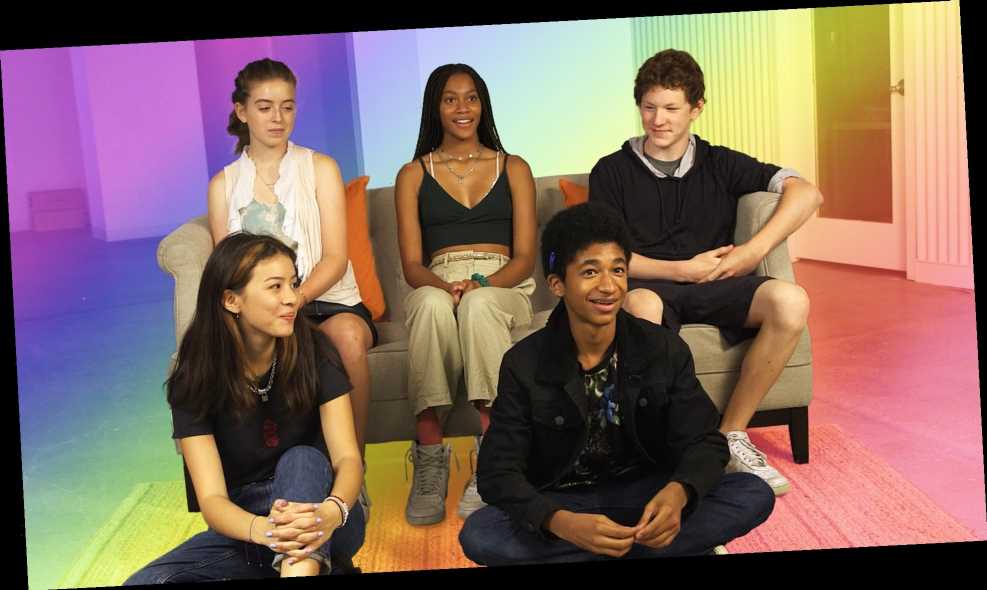We millennials (yes, I am an elder millennial thank you very much) get a lot of crap about a lot of things — from our start-up culture to our supposed entitlement to our avocado toast. But one thing I’m grateful for as a millennial parent is the ability to see and (at least somewhat) understand perspectives from the generations before and after us: Ye Olde Boomers and Gen X behind us, and Gen Z leading the way forward. And let me just say: thank god for Gen Z leading the way forward. These kids — despite their generation facing unprecedented stressors and all-time high mental health risks — are blazing trails in fighting for gun reform, climate justice, equality for everyone everywhere on the LGBTQIA+ spectrum, and more. And what can parents do to support them? In short: Shut up, sit down, and let the kids show the world what’s up.
That’s precisely why we at SHE Media followed a group of 25 preteens and teens for five years through our Hatch Kids project: to learn about these kids and from these kids as they evolve and grow in today’s weird, wild, but wonderful teen culture.
Recently, we sat down with these kids to get their P.O.V. on body confidence and vaping culture. And today they’re getting real about gender: the binary, the arbitrary roles, and why it’s high time we busted free from all of the above. Today’s teens are more gender-nonconforming and gender-fluid than any previous generation, and it’s serving them well.
A 2018 study from the journal Pediatrics, for example, noted that nearly 3% of kids they studied identified as transgender, gender-nonconforming, or non-binary; compare that with an earlier UCLA study (from 2017, so not that much earlier) that found only .7% of teens identifying as transgender, and it’s hard to deny the expansion of gender identity, gender terminology, or both. As for our five-year focus group of 25 kids, our recent follow-up interviews with them support just that trend, with an increase of 10% or more in un-articulated or non-binary gender identities among the 25 kids.
“Gender identity is not what you’re born with; it’s who you are,” one of the Hatch kids, Reed, tells SheKnows, reiterating what science has long known about gender (that it’s a social construct) — but a fact that this country seems oh-so-draggingly delayed in embracing. (Case in point: Why is it so damn hard to let trans kids use the bathroom they’re comfortable with??) “It doesn’t matter what they think,” Reed adds. “It just matters what I think, and how I imagine myself.”
Skye, for one, has reimagined the gender — and the pronouns — they were assigned at birth.
“I’m gender-neutral and I use they/them pronouns,” one teen — formerly referred to as Martha, now self-identified as Skye — tells SheKnows. When asked which bathroom they would use, Skye replies, “Whichever one has a shorter line.” Um, you can hang with us anytime for that response, Skye.
Skye goes on to explain that they’ve spent these past five years we’ve been following their story truly struggling with their gender before coming out as non-binary. “As of this summer I feel a lot more confident. I just felt really weird about myself [before]…I have some pretty specific memories of questioning my gender when I was younger… I’d suppress that.”
“I’m not a boy. I’m also not a girl,” Skye continues. And realizing and acknowledging this? “That was a really important step for me to take,” they add.
And Skye isn’t alone in their questioning. “Right now, I think I identify as male? I’m still kind of figuring it out,” another teen, Zaki, tells SheKnows.
But what’s the biggest struggle for kids coming into their own and identifying as gender-nonconforming? Aside from, you know, U.S. politics (see: aforementioned bathroom awfuless), a huge obstacle can, sadly, be the parents.
“My friends especially immediately started using the right pronouns and correcting themselves when they used the wrong ones,” Skye explains, “as well as using my [new] name as soon as I told them that’s the name I was comfortable with.” But the adults in their life? Not as accommodating.
“I think it’s more nerve-wracking to come out to your parents,” 19-year-old Sadie tells SheKnows, explaining that we expect folks of our own generation to be understanding — older generations, not so much.
So what can we, the parents — whether we’re elder millennials or elder generations entirely — do? Listen to and validate your child and their gender identity. Don’t question, don’t gloss over it, and above all, don’t refer to it as a “phase.” Accepting them for who they are is by far the most important thing you can do to be a good parent to your LGBTQ child — or any child, for that matter.
After all, as Zaki says, “It’s important to be yourself. Because if you’re not yourself, who are you?”
Watch the full video above for more of these firsthand Gen Z takes — and take note. Because these kids are our future, and they’re going to crush it.
Source: Read Full Article
